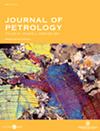Postcumulus processes recorded in whole-rock geochemistry: a case study from the Mirabela layered intrusion, Brazil
IF 3.5
2区 地球科学
Q1 GEOCHEMISTRY & GEOPHYSICS
引用次数: 0
Abstract
According to the “trapped liquid” paradigm, whole-rock chemical compositions of cumulate rocks in layered intrusions can be represented as closed-system multicomponent mixtures of the cumulus phases and the liquids from which they crystallised. Alternative open-system models for cumulate solidification assert that intercumulus liquid is continuously mobile as a result of compaction of crystal mushes. In the closed-system models, all excluded elements, i.e. those incompatible in the cumulus phases, should be correlated with one another, whereas in open systems the more incompatible elements should be decoupled from the more compatible ones and correlations should be poor. These alternative hypotheses are tested using a database of more than 63,000 whole-rock analyses of mostly ultramafic cumulates from a single package of layers across the entire width of the Mirabela layered intrusion, a 2.5 km wide by >2 km thick intrusion with Great Dyke-like stratigraphy. Variably compatible elements Al, Na, Ti and P are found to show strong correlations with one other in olivine-pyroxene cumulates across the spectrum from mesocumulate to orthocumulate rocks, where drill-core sample intervals are composited over 3m; weaker correlations are found over 1m sample intervals. The closed-system trapped liquid model is robust for this suite of rocks at the scale of 3m lengths of drill core (approx. 1 kg of sample). Furthermore, a very smooth and symmetrical variation is observed from dominantly ad- to mesocumulate rocks in the geometrical centre of the intrusion towards orthocumulates at both margins, attributable to increase in cooling rate towards the margins. The most adcumulate rocks are gabbronorites at the base of the mafic sequence in the centre of the intrusion. There is no corresponding decrease in layer thickness towards the centre that would be predicted by a compaction model. The only incompatible element showing partial decoupling is K, which appears to have been mobile at a very late stage, probably in an aqueous fluid phase. There is no evidence for mobilisation of PGEs or other chalcophile elements by this fluid despite the presence of disseminated sulfide throughout the sampled interval.全岩地球化学记录的后积过程:巴西米拉贝拉层状侵入体案例研究
根据 "困液 "范式,层状侵入体中积岩的全岩化学成分可以表示为积岩相及其结晶液体的封闭系统多组分混合物。积岩凝固的另一种开放系统模型认为,积岩间液体由于晶体薄层的压实而不断流动。在封闭系统模型中,所有被排除在外的元素,即积云相中不相容的元素,应该是相互关联的,而在开放系统中,不相容的元素应该与相容性较好的元素脱钩,关联性应该较差。我们使用了一个数据库,该数据库包含了 63,000 多项全岩分析结果,其中大部分是来自米拉贝拉层状侵入体整个宽度上的单一岩层包的超基性岩积块,米拉贝拉层状侵入体是一个宽 2.5 千米、厚 2 千米的侵入体,具有类似大堤的地层结构。研究发现,从中积岩到正积岩,不同相容元素 Al、Na、Ti 和 P 在橄榄石-辉石累积岩中显示出很强的相互关联性,其中钻芯样品区间的组合超过 3 米;1 米样品区间的关联性较弱。在 3 米长的钻孔岩芯(约 1 千克样本)范围内,闭合系统困液模型对这组岩石是稳健的。此外,从侵入体几何中心的主要加积岩到中积岩,再到两个边缘的正积岩,可以观察到非常平滑和对称的变化,这归因于冷却速度向边缘的增加。侵入体中心黑云母序列底部的榴辉岩是吸积性最强的岩石。根据压实模型的预测,向中心的岩层厚度并没有相应减少。唯一显示部分脱钩的不相容元素是 K,它似乎在很晚的阶段才开始移动,很可能是在水相流体中。尽管在整个取样区间都有硫化物散布,但没有证据表明这种流体移动了PGEs或其他亲铬元素。
本文章由计算机程序翻译,如有差异,请以英文原文为准。
求助全文
约1分钟内获得全文
求助全文
来源期刊

Journal of Petrology
地学-地球化学与地球物理
CiteScore
6.90
自引率
12.80%
发文量
117
审稿时长
12 months
期刊介绍:
The Journal of Petrology provides an international forum for the publication of high quality research in the broad field of igneous and metamorphic petrology and petrogenesis. Papers published cover a vast range of topics in areas such as major element, trace element and isotope geochemistry and geochronology applied to petrogenesis; experimental petrology; processes of magma generation, differentiation and emplacement; quantitative studies of rock-forming minerals and their paragenesis; regional studies of igneous and meta morphic rocks which contribute to the solution of fundamental petrological problems; theoretical modelling of petrogenetic processes.
 求助内容:
求助内容: 应助结果提醒方式:
应助结果提醒方式:


